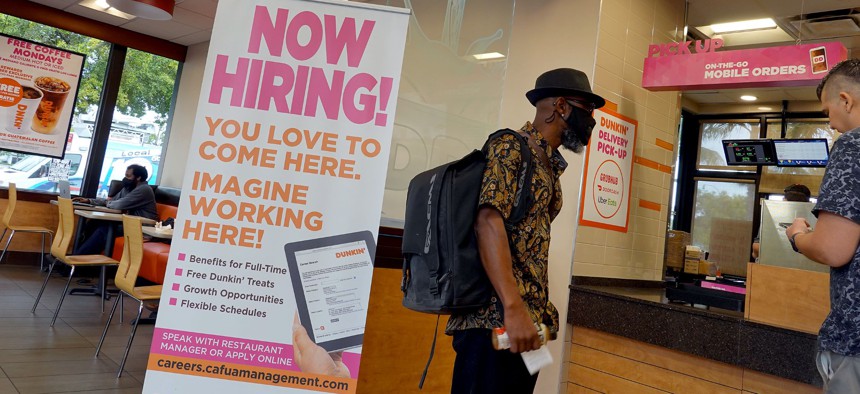Some low-wage earners must choose between pay raises and government assistance

Recent raises for low-wage workers have helped some workers, but caused many others to lose essential public benefits. Joe Raedle/Getty Images
Lawmakers in North Carolina heard from experts about the “benefits cliff” and how other jurisdictions are developing strategies to lessen its impact on low-income families.
This article is republished from NC Newsline. Read the original article.
When Erica received a pay raise from $9.20 an hour to $15 an hour, it sent her tumbling over what is known as the benefits cliff. Erica’s SNAP benefits (food stamps), Medicaid benefits and Women, Infants and Children (WIC) supplement were cut.
The next raise pushed Erica’s pay to $17 an hour. That good fortune cost her all of her benefits.
“That’s the caveat, I guess, of being on government assistance but also wanting more for yourself,” Erica said in a video shared by North Carolina's Charlotte-based Freedom Communities, a nonprofit that focuses on education, affordable housing, employment and health and wellness issues in the the city’s Freedom Drive corridor.
(Erica’s last name and that of Rabian, another woman who shared her benefits cliff story were not provided.)
Freedom Communities showed both videos during a presentation to the state’s Joint Legislative Economic Development and Global Engagement Committee. The committee heard several presentations that focused on benefits cliffs, which occur when career advancement puts a family above the income eligibility threshold for public assistance and the family is financially worse off than before the wage increase.
A benefits cliff can cause workers to decline or delay taking a new job or promotion because they are afraid to lose government assistance.
Hannah Beavers, executive director of Freedom Communities, said the women’s stories illustrate the risks low-wage workers often take when they reach for a better life.
“We know that families, to get out of poverty, need to make more income, but right now it’s costing families too much,” Beavers said.
Beavers said that childcare vouchers are critical to low-wage earners, particularly single mothers. A single mom with two children can earn up $16.75 an hour ($38,840 annually) to qualify for such vouchers, she said.
“Once they earn one cent above that amount, they lose 100% of their childcare voucher,” Beavers said.
The annual cost of infant care in Mecklenburg County is $14,000 per child, she said.
“She [a single mom] cannot afford to take that raise but she cannot afford to not take that raise because in order to afford a two-bedroom apartment, she needs to make at least $22.15 an hour ($46,072 a year),” Beavers said.
Children ages 0-4 are at greatest risk of eviction because their parents are not taking pay raises so that they can afford childcare, Beavers said.
“And then, they can’t afford to pay rent,” she said. “But 90% of a child’s brain develops by the age of five, so these evictions and the stress and the trauma they’re associated with are thwarting the brain development for our next generation.”
The legislative committee could consider whether to create a task force to study the benefits cliff and to develop strategies to lessen its impact on low-income families during the short- session, which starts next month.
A 2021 survey of Alabama workers shared by Brittany Birken, director of community and Economic Development at the Federal Reserve Bank of Atlanta, showed that 37.7% of workers surveyed answered “yes” to a question about whether they had turned down a raise or promotion out of fear of losing government assistance.
Thirty-three percent of businesses responding to a 2021 Florida Chamber of Commerce survey reported that some employees or job candidates are unwilling to accept jobs, increased hours or other advancements because the fear the loss of government benefits.
Birkin shared these state’s strategies to mitigate benefits cliffs:
Sen. Tim Moffitt, R-Henderson, noted that Thursday’s presentations focused on single-parent, female led households.
“There’s a true crisis among men,” Moffitt said. “Where are the fathers of these children? What role are they not fulfilling as the backbone of the family?”
If the General Assembly creates a task force to study the benefits cliff problem, it must take a look at policies that have “led to a tremendous amount of dependency on government assistance,” Moffitt said.
“We need to look at the policies and really have a honest discussion about those polices and say, yeah, it was a well-intended policy, but the downstream impact has created or condemned people to a life of poverty,” he said.
NC Newsline is part of States Newsroom, a nonprofit news network supported by grants and a coalition of donors as a 501c(3) public charity. NC Newsline maintains editorial independence.

NEXT STORY: Senate at an ‘impasse’ over restoring child tax credit





